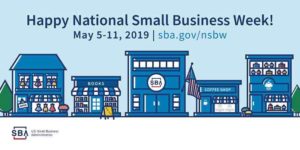#smallbusinessweek

By Mike Brown
For many of us, running a small business is the quintessential American dream. After all, a business owner is responsible for calling the shots, whether that means picking their own schedule or determining the best route to boost income.
But owning a small business, or one that has fewer than 500 employees, isn’t always easy. Long hours, significant financial investments, and general uncertainty can make entrepreneurship quite stressful. And while the number of startups has shown an upward trend since 2010, with over 400,000 startups opening in 2016 and 2017, not every story is one of success and longevity.
Instead, almost one in 12 small businesses will close every year, though the reasons behind those closures can vary.
Success in Small Business Often Depends on Industry
Statistically speaking, success is often a matter of industry. For instance, many of us have heard the warnings that accompany the restaurant business, particularly since a staggering 50% of them will fail by the fifth year. Transportation and warehousing businesses face similar statistical challenges, with 70% of them folding by their fifth year.
Still, other businesses have a more positive outlook, at least when it comes to the numbers. Take for example healthcare and social assistance businesses, nearly 60% of which will remain open after their fifth year.
But There Are Other Reasons Why Small Businesses Fail
While industry certainly can impact a business’s likelihood of success, there are numerous other factors that can play a role, many of which can have a much more direct impact on success. Here are a few common pain points that small business owners should be wary of:
Market concerns: One of the primary reasons businesses can fail is simple—no one is buying, at least according to 42% of business owners who cited market as a reason for failure.
Without a defined market for a product or service, turning a profit becomes impossible, and as logic would suggest, a lack of revenue makes it impossible to meet operational expenses and keep doors open.
Cash flow: Running a successful business often means engaging in a delicate dance that connects incoming and outgoing cash in such a way that there are few, if any, gaps in cash flow. Doing so is challenging, and according to 29% of businesses running out of cash was a primary reason for failure. One way that small business owners can attempt to ease the tension caused by cash flow is through taking out a small business loan.
Employee performance: Employees, from top tier executives to hourly workers, are responsible for keeping a business running; therefore, it’s no wonder 23% of owners point to poor employee performance or unfortunate hiring choices as the reason for failure.
Branding: An increase in startups can speak volumes about the health of the economy, but it can also lead to a highly-competitive or over-saturated market. Often time, it’s the businesses that position their brands as different, authentic, and alluring that stand the test of time. It comes as little surprise then that those businesses that fail to stand out in the crowd are the ones that are forced to close their doors.
Will Minimum Wage Increases Impact Small Business?
With cash flow and employee performance tied so closely to the success or failure of a business, payroll inevitably becomes a concern. And, as minimum wages throughout the U.S. increase, do businesses owners fear that their bottom lines will carry the brunt of a higher minimum wage?
To determine how employers were reacting to minimum wage increases, LendEDU polled small business owners from California, New York, Washington, D.C., and the city of Seattle. In all these locations, minimum wage rates are scheduled to reach $15 in the coming years, if they aren’t already there. Here are some things to keep in mind.
Just under 80% of respondents were aware of the $15 minimum wage increase. That’s a real plus since adapting often requires diligent planning, particularly as it relates to expenses, product/service pricing, and payroll increases.
Though meeting the demands of an increased minimum wage can be difficult, many small business owners are optimistic. Just about a quarter of respondents (25.8%) felt the increase would be great for their small business, and 30.8% felt that the increases wouldn’t have an impact one way or the other. Overall, 38.69% of respondents were confident that their business would survive the minimum wage movement.
Still, a large portion of respondents (43.07%) were unsure how the minimum wage would impact their ability to remain open, and 18.25% felt that it could force a closure.
Small businesses make up 99.7 percent of U.S. employer firms, and therefore they are the backbone of our nation’s economy. Although failure statistics can serve as a source of anxiety for some business owners, they can also help entrepreneurs recognize potential pain points and adapt their business plan to account for those concerns, including the direct and indirect impact of a rising minimum wage.
In his role at LendEDU, Mike Brown uses data, usually from surveys and publicly-available resources, to identify emerging personal finance trends and tell unique stories. Mike’s work, featured in major outlets like The Wall Street Journal and The Washington Post, provides consumers with a personal finance measuring stick and can help them make informed finance decisions.
Small business failure stock photo by SpeedKingz/Shutterstock







